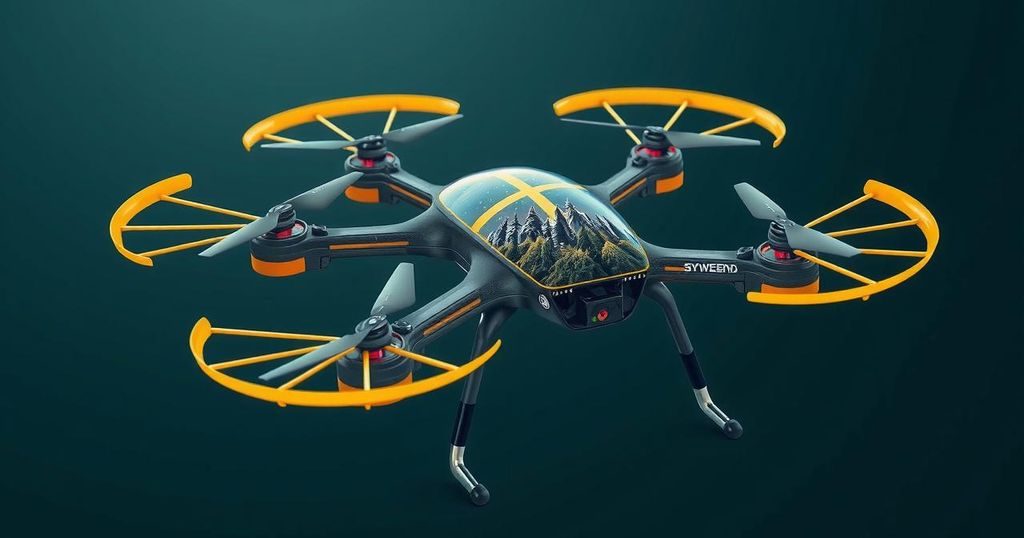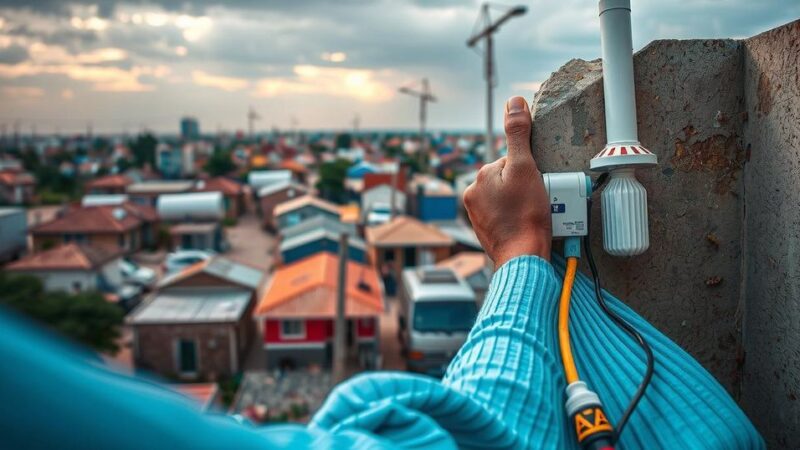The Combat Climate Change (C-3) UAV project, launched by Sweden and Colombia, aims to enhance climate research through an unmanned aerial vehicle equipped with advanced sensors. This collaboration involves key academic and governmental institutions and seeks to collect crucial environmental data for effective monitoring of ecosystems and greenhouse gas emissions.
In response to the pressing challenge of climate change, representatives from Sweden and Colombia, including the Swedish Minister for Climate and the Environment and Colombia’s Minister of Science, have inaugurated the Combat Climate Change (C-3) unmanned aerial vehicle (UAV) project. This initiative, undertaken in collaboration with Saab, EAFIT University, and KTH Royal Institute of Technology, aims to enhance climate research through advanced technology. The UAV developed through this project possesses specialized sensors designed to measure concentrations of greenhouse gases, including carbon dioxide and methane, as well as other atmospheric pollutants. Furthermore, the aerial vehicle will play a crucial role in monitoring the health of ecosystems, particularly the Amazon rainforest and agricultural regions, by detecting changes in vegetation and soil conditions. This initiative was publicly launched during COP16 by prominent figures such as Romina Pourmokhtari, the Swedish Minister for Climate and the Environment; Yesenia Olaya, the Colombian Minister of Science; Eva Axelsson, Head of Group Sustainability at Saab; and Olga Lucía Quintero, academic supervisor from EAFIT University. Minister Pourmokhtari emphasized the significance of this collaboration, stating, “We are pleased to announce this landmark initiative, which not only exemplifies the robust cooperation between Colombia and Sweden but also celebrates our shared commitment to technological innovation for environmental protection and monitoring.” The project aspires to integrate aerial data with satellite imagery, providing comprehensive environmental assessments. This synergy is pivotal for developing large-scale predictive models using artificial intelligence (AI) to better grasp and manage global climate intricacies. Minister Olaya highlighted the importance of this project for Colombia by asserting, “Contributing to mitigating climate change is one of the priorities of President Petro’s government… Monitoring biodiversity and climate change will help us anticipate and find solutions from science, technology and innovation to the challenges that this poses.” The design and construction of the UAV have been carried out by a diverse group of research engineers from KTH Royal Institute of Technology and EAFIT University since February 2023. The collaboration aims to implement the Triple Helix model, which seeks to align scientific knowledge with societal and commercial interests for impactful results. Eva Axelsson from Saab further noted that the organization supports innovative approaches to combat climate change, emphasizing the role of cooperation. In summary, this international collaboration represents a significant advancement in utilizing drone technology for effective climate monitoring, showcasing a commitment to innovation in tackling the environmental challenges faced globally.
The Combat Climate Change (C-3) project underscores a significant international collaboration aimed at addressing climate change through advanced technology. The initiative arises amidst growing concerns regarding environmental degradation and the need for effective monitoring and management strategies to safeguard vital ecosystems. By integrating scientific research with technological application, the project seeks to create innovative solutions capable of informing climate action on a global scale. The involvement of esteemed institutions from Sweden and Colombia not only broadens the scope of climate research but also sets a precedent for future cooperative endeavors in environmental stewardship.
The Combat Climate Change (C-3) UAV project symbolizes a progressive effort in the fight against climate change through international collaboration. By leveraging advanced drone technology for comprehensive environmental data collection, this initiative seeks to better understand and manage climate impacts. The integration of international expertise and resources highlights the commitment of both Sweden and Colombia to addressing climate-related challenges while fostering innovation and scientific advancement.
Original Source: www.saab.com







